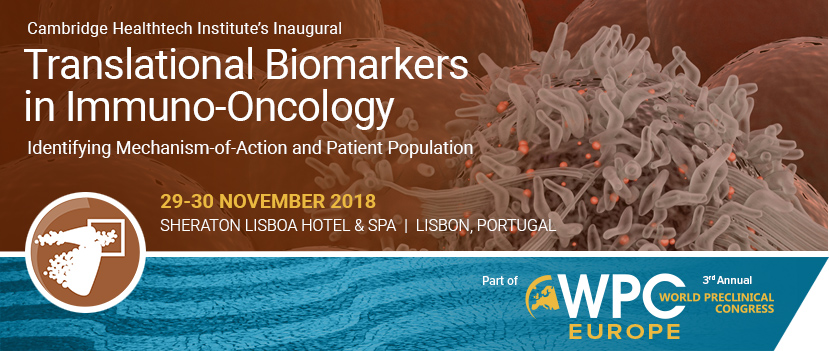
Challenges in discovering predictive biomarkers for cancer immunotherapy involve multiple cell types, multiple mechanisms of T-cell regulation, genetic heterogeneity of tumors, immune components, etc. At the same time, biomarker strategies are shaping
the current state of immuno-oncology and will become increasingly important. Cambridge Healthtech Institute’s Inaugural Translational Biomarkers in Immuno-Oncology conference is designed to bring together researchers
from pharmaceutical companies, preclinical and clinical biomarker CROs, and laboratory medicine community to discuss the underlying mechanisms of cancer immunotherapy, exploratory and translational biomarkers, emerging clinical assays aiming to advance
new agents discovery and development and to improve patient outcomes.
Final Agenda
Day 1 | Day 2 | Download Brochure
Recommended All Access Package:
27 November: Single-Cell Analysis
27 November Dinner Course: SC3: The Origins, Optimization and Application of Organ-on-a-Chip Systems
28-29 November: Preclinical Models for Cancer Immunotherapy and Combinations
29-30 November: Translational Biomarkers in Immuno-Oncology
29 November Dinner Course: SC5: Humanized Mouse Models: Technology and Applications in Preclinical Assessment of Cancer Immunotherapy
Thursday 29 November
12:30 Registration
13:25 Welcome Remarks
Marina Filshtinsky, Executive Director, Cambridge Healthtech Institute
13:30 Chairperson’s Opening Remarks
Jennifer Mataraza, PhD, Group Lead, Translational Immuno-Oncology, Novartis Institutes of Biomedical Research
13:35 Advancing Immuno-Oncology Combinations in the Clinic: Lessons from Mice and Men
Jennifer Mataraza, PhD, Group Lead, Translational Immuno-Oncology, Novartis Institutes of Biomedical Research
Immune checkpoint blockade therapies are revolutionizing the standard cancer treatment. Despite the current success of anti-PD1/PDL1 therapies, not all patients respond. Combination approaches are the keys to improving clinical response. Macrophage targeting
therapies are an attractive combination partner for anti-PD-1 pathway blockade; this is currently being tested in the ongoing Phase Ib/II study of Lacnotuzumab (anti-CSF-1) and Spartalizumab (anti-PD-1) in patients with advanced solid tumors.
Emerging efficacy and biomarker data will be presented.
14:05 Biomarker Discovery and Translational Immune-Oncology: Use of Human Tissue-Based Models in Preclinical Research
Svetlana Sadekova, Senior Principal Scientist, Head of Translational Pathology Group, Merck
Rapid advancement of immuno-oncology is creating the need for translational strategies to guide indication selection, understand mechanisms of resistance and identify biomarkers of response. This talk will highlight the importance of understanding human tumor microenvironment and focus on strategies based on utilizing human tissues for preclinical and clinical
translational research.
14:35 Pathologist Involvement in Image Analysis Powered Biomarker Quantification
 Abraham Silva Carmona, Pathologist, Definiens,
Subsidiary of Medimmune/AstraZeneca
Abraham Silva Carmona, Pathologist, Definiens,
Subsidiary of Medimmune/AstraZeneca
Image analysis based quantification of immunohistochemical biomarkers is a powerful method supporting both the preclinical as well as the clinical area of drug development by enabling the analysis of spatial relationships between different cell populations.
To leverage the full potential of image analysis and provide the best quality data the pathologist should be involved in every step of the process.
15:05 Interactive Breakout Discussion Groups - View Details
This session features various discussion groups that are led by a moderator/s who ensures focused conversations around the key issues listed. Attendees choose to join a specific group and the small, informal setting facilitates sharing of ideas and active
networking.
Immunological Determinants of Response to Systemic Therapy In Cancer
Moderator: Sofia Braga, MD, PhD, Assistant Professor, Instituto CUF Oncologia, NOVA Medical School
Abraham Silva Carmona, Pathologist, Definiens, Subsidiary of Medimmune/AstraZeneca
- Neoplastic cell attributes: neoantigen load, mutational burden, mismatch repair deficient cells / high microsatelite instability
- Immune system attributes: baseline T cell infiltration; cytotoxic "antitumor" T cells, low tolerogenic T cells, PDL1, CD8, B2M; TCR sequencing; T cell clones; intact immunity
- Translational biomarkers in pharma research: strategy and timeline
Liquid Biopsy in IO Research
Moderator: Evi Lianidou, PhD, Professor of Clinical Chemistry, University of Athens
- Tumor diagnosis, monitoring, and treatment
- Blood tests / biomarkers
- Mutational analysis of tumors and blood
16:05 Refreshment Break in the Exhibit Hall with Poster Viewing
16:45 Leveraging Concomitant Medications Data for in silico Phase Ib Clinical Trials
 Matthew Albert, MD, PhD, Principal Scientist, Cancer Immunology, Genentech
Matthew Albert, MD, PhD, Principal Scientist, Cancer Immunology, Genentech
A standardized approach to the assessment of pathologic response is necessary for reliable interpretation of the post-treatment resection specimens in patients receiving neoadjuvant anti-PD-1 therapy. Neoadjuvant specimens also provide a unique window
into the mechanism of action of immune checkpoint blockade. The features of immune-mediated tumor clearance will be described, and a provisional, reproducible scoring system for pathologic response to neoadjuvant anti-PD-1 based on these features
will be presented.
17:15 Factors That Influence Circadian Rhythm of Endogenous Biomarker Kynurenine (Kyn) and Tryptophan(Trp)
Richard (Xu) Zang, PhD, DMPK, Genentech
Kynurenine (Kyn) and tryptophan (Trp) are well studied biomarkers for the regulatory and functional aspects of Trp 2,3-dioxygenase (TDO) and indoleamine 2,3-dioxygenase (IDO) enzyme. The Kyn and Trp pathway has been a target of high interest as any dysregulation
or overactivation of this pathway could be associated with immune system related pathologies. Our results indicated that there is a circadian rhythm of the basal level of Kyn and Trp concentration. Various intrinsic and external factors that could
influence the basal level fluctuation of Kyn and Trp concentration were indentified. Pharmacodynamic modeling efforts were employed to quantitatively describe the circadian rhythm of Kyn and Trp in preclinical animal models.
17:45 PANEL DISCUSSION: Exploratory and Translational Biomarkers in IO: Evolutionary Approach
Moderator: Matthew Albert, MD, PhD, Principal Scientist, Cancer Immunology, Genentech
Panelists: Jennifer Mataraza, PhD, Group Lead, Translational Immuno-Oncology, Novartis Institutes of Biomedical Research
Svetlana Sadekova, Senior Principal Scientist, Head of Translational Pathology Group, Merck
Richard (Xu) Zang, PhD, DMPK, Genentech
18:15 Close of Day and Dinner Short Course Registration
19:00 – 21:30 Recommended Dinner Short Course*
SC5: Humanized Mouse Models: Technology and Applications in Preclinical Assessment of Cancer Immunotherapy
* Separate registration required.
Day 1 | Day 2 | Download Brochure
Friday 30 November
8:30 Registration and Morning Coffee
8:55 Chairperson’s Remarks
Svetlana Sadekova, Senior Principal Scientist, Head of Translational Pathology Group, Merck
9:00 Immunological Determinants of Response to Neoadjuvant Chemotherapy in Breast Cancer
 Sofia Braga, MD, PhD, Assistant Professor, Instituto CUF Oncologia, NOVA Medical
School
Sofia Braga, MD, PhD, Assistant Professor, Instituto CUF Oncologia, NOVA Medical
School
Neoadjuvant chemotherapy is the treatment option for locally advanced breast cancer. However, more than half of the patients do not respond. We need clinical biomarkers that could predict treatment response. Tumor infiltrating lymphocytes, CD8+ and Tregs,
are being studied. Nonetheless, tumor cells can escape the immune system by releasing cytokines or expressing immune checkpoint inhibitors. T cell activation markers could be reliable biomarkers of response reflecting the tumor immune environment.
9:30 Translating Breast Cancer Immune Features into Putative Biomarkers: HLA-DR in Cytotoxic T Lymphocytes Predicts the Response to Neoadjuvant Chemotherapy
 Maria Guadalupe Cabral, PhD, Invited
Assistant Professor, CEDOC/NOVA Medical School – Faculdade de Ciências Médicas/Universidade NOVA de Lisboa
Maria Guadalupe Cabral, PhD, Invited
Assistant Professor, CEDOC/NOVA Medical School – Faculdade de Ciências Médicas/Universidade NOVA de Lisboa
Prediction of breast cancer response to Neoadjuvant Chemotherapy (NACT) is needed to promptly direct non-responders to alternative therapies. It has been suggested that efficacy of chemotherapy relies on infiltrating lymphocytes but considering that
lymphocytes activity could be spoiled by the tumor, their presence per se has a modest prognostic value. We disclosed that the activation of Cytotoxic T lymphocytes, revealed by HLA-DR expression, is a more attractive predictor of NACT-response.
10:00 Coffee Break in the Exhibit Hall. Last chance for poster viewing.
10:45 Meet the Nanoimager, the Next Generation Platform for Enhanced Biomarker Discovery
Mariya Georgieva, PhD, Business Development, Oxford Nanoimaging (ONI)
Quantitative imaging techniques are powerful tools enhancing the predictability and reliability of pre-clinical models for drug discovery and target validation. With a mission to significantly enhance the performance and accelerate biomarker discovery
pipelines, ONI provides the drug discovery sector with desktop-compatible instruments capable of single-molecule sensitivity allowing for direct observation and measurement of molecular interactions, cellular dynamics and complex tissue phenotypes.
11:15 Versatile Dendritic Nanoparticles for Immunotherapy, Gene Delivery, and Controlled Tumor Penetration
Seungpyo Hong, PhD, Professor, Pharmaceutical Sciences Division, School of Pharmacy, University of Wisconsin - Madison; Director, Wisconsin Center for NanoBioSystems (WisCNano)
Dendritic polymers have drawn considerable attention to be used as a nanocarrier platform for various therapeutic agents over the past few decades. Major advantages of the macromolecules include: i) the ability to mediate strong multivalent
binding; ii) efficient, controlled tumor penetration due to their sub 10 nm size and deformability; and iii) facile multifunctionalization through various conjugation chemistries. In this presentation, our recent efforts on using poly(amidoamine)
(PAMAM) dendrimers for immunotherapy and miRNA delivery will be summarized.
11:45 KEYNOTE PRESENTATION: Cancer Metastasis and Liquid Biopsy
 Klaus Pantel, MD, Director, Institute of Tumor Biology, University
Hospital Hamburg-Eppendorf
Klaus Pantel, MD, Director, Institute of Tumor Biology, University
Hospital Hamburg-Eppendorf
Functional characterization of CTCs using specialized in vitro and in vivo test systems has started, which might provide novel insights into the biology of metastatic tumor cells
and serve as models for drug testing. New blood-based biomarkers currently validated in clinical trials include miRNAs, exosomes and tumor-educated platelets.
12:15 Enjoy Lunch on Your Own
13:40 Chairperson’s Remarks
Ed Schuuring, PhD, Head of the Laboratory for Molecular Pathology, Senior Clinical Scientist of Molecular Pathology, Department of Pathology, University Medical Center Groningen
13:45 Functional Analyses of Circulating Tumor Cells in Cancer Patients
 Catherine Alix-Panabières,
PhD, Director, Laboratory Detection of Rare Human Circulating Cells (LCCRH), University Medical Centre of Montpellier
Catherine Alix-Panabières,
PhD, Director, Laboratory Detection of Rare Human Circulating Cells (LCCRH), University Medical Centre of Montpellier
Circulating tumor cells (CTCs) in blood are promising new biomarkers potentially useful for prognostic prediction and monitoring of therapies in patients with solid tumors. CTC-research opens a new avenue for understanding the biology of metastasis
in cancer patients. As an in-depth investigation of CTCs is hampered by their low number, the establishment of cell-cultures and permanent cell lines from CTCs has become the most challenging task over the past year.
14:15 Epigenetic Alterations in CTCs and Corresponding ctDNA
 Evi Lianidou, PhD, Professor of Analytical Chemistry – Clinical
Chemistry, Laboratory of Analytical Chemistry, Analysis of Circulating Tumor Cells (ACTC) Lab, Department of Chemistry, National and Kapodistrian University of Athens
Evi Lianidou, PhD, Professor of Analytical Chemistry – Clinical
Chemistry, Laboratory of Analytical Chemistry, Analysis of Circulating Tumor Cells (ACTC) Lab, Department of Chemistry, National and Kapodistrian University of Athens
Our group was the first to demonstrate epigenetic alterations in CTCs and corresponding ctDNA (Chimonidou et al., Clin Chem 2011, Clin Chem 2013). Epigenetic silencing of estrogen receptor gene (ESR1) could be of clinical relevance especially
for its potential impact on endocrine treatment efficacy. In this study, we evaluated for the first time ESR1 methylation in CTCs, paired ctDNA and primary tumors of breast cancer patients.
14:45 ctDNA as a Biomarker for Early Tumor Response Assessment in Lung Cancer Patients Treated with Immunotherapy
 Ed Schuuring, PhD, Head of the Laboratory for Molecular Pathology,
Senior Clinical Scientist of Molecular Pathology, Department of Pathology, University Medical Center Groningen
Ed Schuuring, PhD, Head of the Laboratory for Molecular Pathology,
Senior Clinical Scientist of Molecular Pathology, Department of Pathology, University Medical Center Groningen
Currently, we are not able to reliably predict which patients benefit from immune checkpoint inhibitors (iCPI). PD-L1 tumor expression levels (among others) are not reliable predictors for the individual response to iCPI. The aim of this study
was to assess changes of ctDNA levels in cell-free plasma during therapy as an early response biomarker and a monitoring tool for durable responses to immunotherapy in KRAS/BRAF mutated advanced NSCLC.
15:15 PANEL DISCUSSION: Developing Circulating Biomarkers for Clinical Research
Moderator: Evi Lianidou, PhD, Professor of Analytical Chemistry – Clinical Chemistry, Laboratory of Analytical Chemistry, Analysis of Circulating Tumor Cells (ACTC) Lab, Department of Chemistry, National and Kapodistrian University of Athens
Panelists: Klaus Pantel, MD, Director, Institute of Tumor Biology, University Hospital Hamburg-Eppendorf
Catherine Alix-Panabières, PhD, Director, Laboratory Detection of Rare Human Circulating Cells (LCCRH), University Medical Centre of Montpellier
Ed Schuuring, PhD, Head of the Laboratory for Molecular Pathology, Senior Clinical Scientist of Molecular Pathology, Department of Pathology, University Medical Center Groningen
- Prognostic vs. Predictive Markers: Where is the clinical utility?
- Do CTC platforms matter?
- Automated vs. observer-dependent calls: advantages and disadvantages
- How can we best incorporate circulating biomarkers into clinical trials?
15:45 Close of Conference
Day 1 | Day 2 | Download Brochure